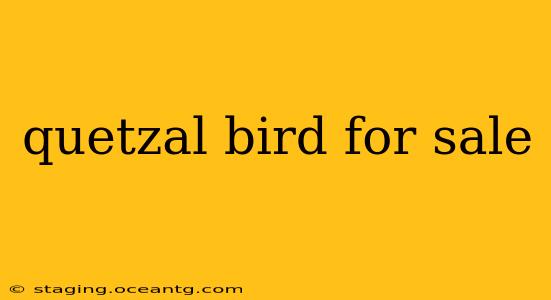Finding a Quetzal: A Guide to Responsible Ownership and Conservation
The resplendent quetzal ( Pharomachrus mocinno) is a breathtakingly beautiful bird, renowned for its iridescent green plumage and exceptionally long tail feathers in males. Its stunning appearance often leads to a desire to own one, but it's crucial to understand that buying a quetzal is unethical and, in most places, illegal. This guide explores the reasons behind this, the challenges of keeping a quetzal as a pet, and how you can support their conservation instead.
Are Quetzals for Sale Legally?
No. The resplendent quetzal is a protected species under various international and national laws. The Convention on International Trade in Endangered Species of Wild Fauna and Flora (CITES) lists it in Appendix II, meaning international trade is regulated to prevent it from becoming threatened. Many countries within its natural range also have strict laws prohibiting the capture, sale, and possession of quetzals. Attempting to buy a quetzal is likely to result in significant legal penalties.
Why You Shouldn't Buy a Quetzal
Beyond the legal ramifications, there are compelling ethical and practical reasons to avoid purchasing a quetzal:
- Habitat Destruction: The illegal wildlife trade significantly contributes to habitat loss and the overall decline of quetzal populations. Purchasing a quetzal fuels this destructive practice.
- Animal Welfare: Quetzals are highly specialized creatures adapted to specific cloud forest habitats. Keeping them in captivity, even in the most well-intentioned setups, is incredibly difficult and often results in stress, illness, and premature death. Their unique dietary needs and social behavior are hard to replicate in captivity.
- Disease: Wild-caught birds can carry diseases that are transmissible to humans and other animals.
- Low Survival Rates: The stress of capture, transportation, and confinement dramatically reduces a quetzal's chances of survival.
What are the Challenges of Keeping a Quetzal as a Pet?
Even if you were to obtain a quetzal legally (which isn't possible for wild-caught birds), the challenges are immense:
- Specialized Diet: Quetzals primarily eat fruits, insects, and other invertebrates found in their natural habitat. Replicating this diet precisely in captivity is extremely difficult.
- Climate Requirements: They require a very specific climate to thrive, including consistent high humidity and relatively cool temperatures. Maintaining these conditions can be challenging and expensive.
- Enrichment Needs: Quetzals are active birds that need a large, stimulating enclosure to prevent boredom and stress. Providing appropriate enrichment is crucial for their well-being.
- Veterinary Care: Finding a veterinarian experienced in treating exotic birds like quetzals is often challenging.
How Can I Help Quetzals Instead of Buying One?
Instead of contributing to the illegal wildlife trade, consider supporting quetzal conservation efforts:
- Donate to Conservation Organizations: Many organizations work to protect quetzal habitats and conduct research. Research reputable organizations and contribute to their efforts.
- Support Sustainable Tourism: Choose eco-friendly tour operators that promote responsible wildlife viewing and conservation. Observe quetzals in their natural habitat, respecting their space and freedom.
- Educate Others: Spread awareness about the importance of quetzal conservation and the illegality of the wildlife trade.
The resplendent quetzal is a symbol of beauty and freedom. Let's ensure its future lies not in cages but in the vibrant cloud forests it calls home. By choosing to appreciate these magnificent birds from afar and supporting conservation efforts, we can help protect this iconic species for generations to come.
